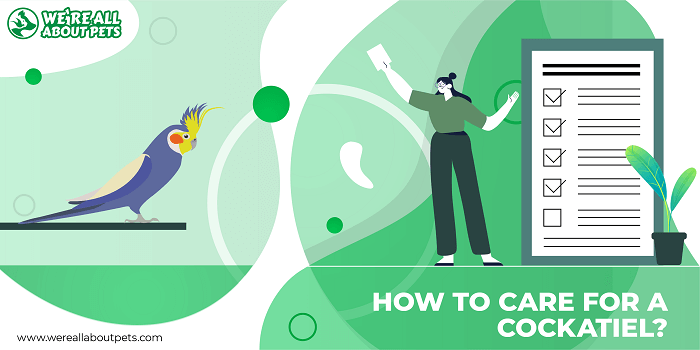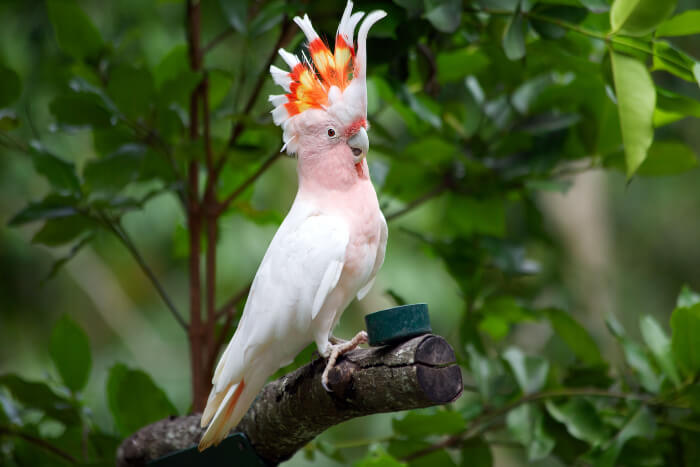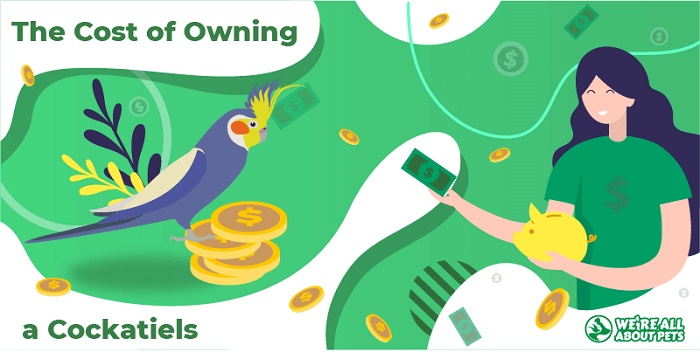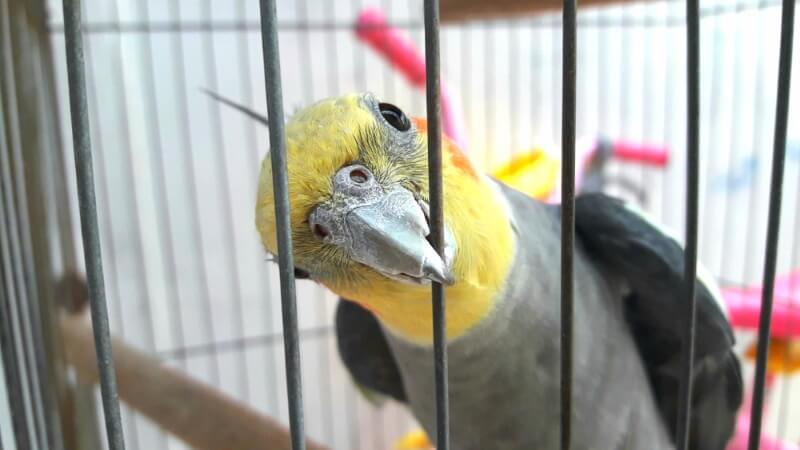How To Care For A Cockatiel?
This page contains affiliate links. We may earn money or products from the companies mentioned in this post through our independently chosen links, which earn us a commission. Learn More
General Stats:
- Pet Type: Bird
- Size: Up to 12 inches
- Diet: Omnivore
- Lifespan: 15 years
The smallest members of the cockatoo family, cockatiels are lively, social birds. These birds are intelligent enough to learn commands and have the potential to bond closely with their humans.
Cockatiels are gentle by nature and easy to tame, though they do require a certain amount of daily interaction. These pet birds aren’t complicated to keep, but it’s important to provide for their basic needs including a roomy cage, a healthy diet, and outlets for mental stimulation and exercise.
Here’s what you need to know about caring for a cockatiel.
Habitat Setup For Cockatiels
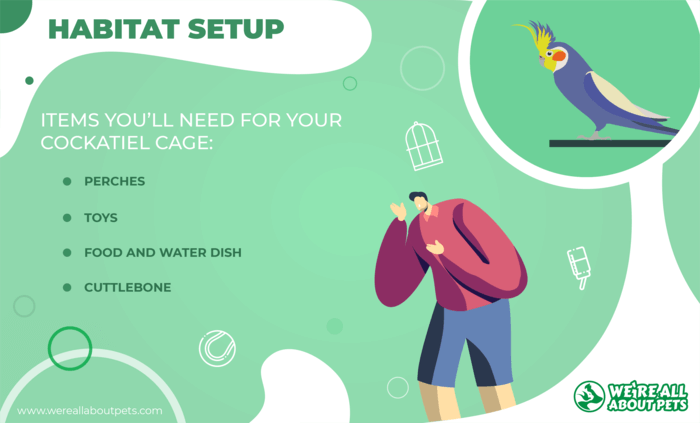
The cockatiel is a very social bird by nature, so you should consider keeping more than one. If you do, however, you’ll need to choose a larger cage to provide adequate space for your birds. The minimum cage size for a single cockatiel is 24x18x24 inches, though a larger cage is always better.
When it comes to choosing a cockatiel cage, it’s important to consider the dimensions and the materials from which the cage is made. Cockatiels grow up to 12 inches tall and they have a crest on the top of their head, so look for a cage that is at least 24 inches tall. The cage should be made from sturdy materials with horizontal bars on at least two sides so your birds can climb.
Here are some of the items you’ll need for your cockatiel cage:
- Perches – Provide at least two perches at different heights in the cage and make sure the perches are of different thickness and texture for the health of your cockatiel’s feet.
- Toys – These provide your cockatiel with mental stimulation and exercise. Good examples of cockatiel toys include things like bells, mirrors, ladders, balls, etc.
- Food and Water Dish – The number of food bowls should reflect the number of birds you keep in the cage. Avoid placing the water bowl and food dishes directly below a perch.
- Cuttlebone – A cuttlebone helps keep your pet bird’s beak trimmed and provides essential calcium as well as a source of entertainment.
In addition to outfitting your cockatiel’s cage properly, you should also think about its placement. Birds can be sensitive to drafts, so place the cage away from open windows and air vents. Your cockatiel will appreciate having daily opportunities to interact with you but avoid placing the cage in a busy room because it could interfere with the bird’s ability to get enough sleep.
Cockatiels need a good 10 to 12 hours of sleep per day, so you may need to make adjustments to make sure your bird gets enough rest. Consider getting a cage cover to keep the environment dark and quiet.
Cockatiel Diet
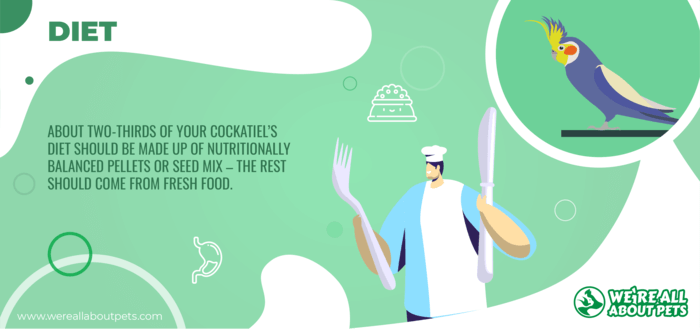
Providing a healthy and balanced diet is one of the most essential aspects of pet cockatiel care. Cockatiels are omnivores by nature, though they feed primarily on grass seeds, fruits, berries, and other vegetation in the wild. They have even been known to raid farmer’s crops.
Here are some quick facts about the ideal cockatiel diet:
- About two-thirds of your cockatiel’s diet should be made up of nutritionally balanced pellets or seed mix – the rest should come from fresh food.
- Even if you choose to feed your cockatiel a seed diet, you should provide some commercial cockatiel bird food to fill nutritional gaps and you may need to consider vitamin supplements. It is recommended you provide a cuttlebone for calcium as well.
- Offer your cockatiel a wide variety of foods to supplement his daily diet including fresh fruit and fresh vegetables – be sure to offer different foods several times a week.
- Treats can be given a few times a week in small amounts – good examples include things like millet spray, wholegrain pasta, cooked eggs, and dried insects.
- Feed your cockatiel about 1 ½ to 2 tablespoons of seed or pellets per day – divide it between the food bowls and the bottom of the cage so your bird can forage for the food.
In addition to food, be sure to provide your pet with unlimited access to fresh water as well. In the wild, cockatiels get the majority of their hydration from food, but you’ll need to provide water. A small water bowl is perfectly fine – just make sure to clean it and refill it on a daily basis.
Cockatiel Veterinary Care
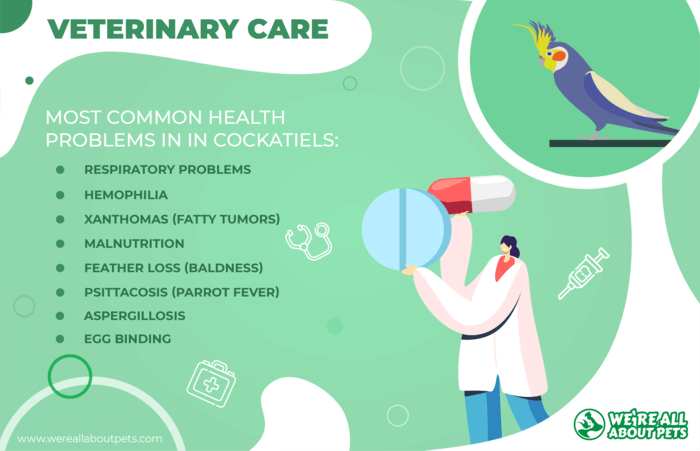
Your cockatiel’s health and wellness are your responsibility. Providing a balanced diet is the best way to support your bird’s health but you should also find an avian vet where you can take your bird when needed. It’s a good idea to have your new pet seen by a veterinarian within a few weeks of bringing him to his new home and then keep up with annual checkups.
Here are some of the most common health problems in cockatiels:
- Respiratory problems
- Hemophilia
- Xanthomas (fatty tumors)
- Malnutrition
- Feather loss (baldness)
- Psittacosis (parrot fever)
- Aspergillosis
- Egg binding
A healthy cockatiel should be bright-eyed and active. If your bird’s feathers are fluffed up during the day or if he spends a lot of time sitting at the bottom of his cage, it could be a sign of illness. Other symptoms of illness include sneezing, failure to eat, and sleeping more than usual.
You should expect to spend between $35 and $50 per visit to see an avian vet, but the costs could be higher if your cockatiel needs treatment. Remember that not all veterinarians are trained to care for birds, so you may need to do some research to find an avian or exotics vet in your area.
Cockatiel Fun Facts
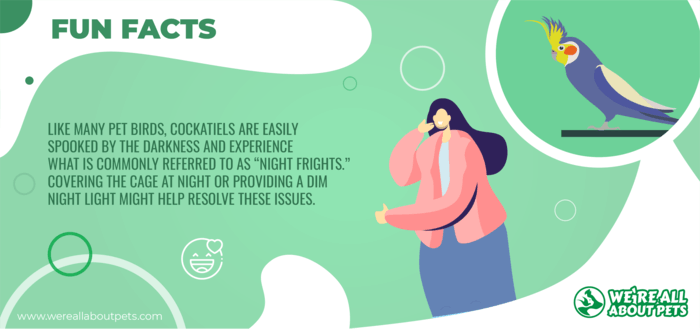
- Like many pet birds, cockatiels are easily spooked by the darkness and experience what is commonly referred to as “night frights.” Covering the cage at night or providing a dim night light might help resolve these issues.
- In the wild, cockatiels roost communally and tend to eat in the morning and early evening, sleeping during the remaining 10 to 12 hours of the day.
- Cockatiels are very social birds and can sometimes be introduced to other birds, though they should always be housed in separate cages. If you already have a bird, make sure to introduce your baby cockatiel to the other bird early as young birds are more likely to adapt.
- Male cockatiels tend to be better at whistling and talking than female cockatiels – in the wild, male cockatiels use sounds to attract females.
- Cockatiels make very good parents. Though the mother is responsible for incubating the eggs and caring for newborn chicks, the father becomes quite protective and can be very nurturing.
- The most common coloring for the cockatiel is a grey body with white flashes on the outer edge of each wing. In males, the face is usually yellow or white while females have light grey faces. Both sexes exhibit a round orange area over each ear.
Many bird enthusiasts consider the cockatiel a great option for first-time bird owners because they are gentle, easy to tame, and fairly low maintenance. That being said, cockatiels require just as much care and attention as any other pet, so be sure to do your research to ensure it is the right choice for you.
Frequently Asked Questions
How long do cockatiels live?
The average lifespan for a pet cockatiel is 15 to 25 years, though some have been known to live 30 years or more.
How much do cockatiels cost?
When it comes to the cost of a pet cockatiel, there are many factors to account for. The cost to purchase a cockatiel depends on the type you get as well as the number of birds. Cockatiels come in a variety of colors other than the normal grey and some varieties like albino, pied, and lutino cockatiels cost more. You should expect to spend at least $75 up to $150 for a standard cockatiel. Additional costs to factor in include the cost of your bird’s cage, food, and medical expenses. Budget an additional $200 to $500 for startup costs and about $25 a month for food and supplies.
How big do cockatiels get?
Cockatiels grow to a maximum height around 12 inches. Though they are the smallest member of the cockatoo family, they still have a crest on the top of their head which adds to their height.
What do cockatiels eat?
In the wild, cockatiels eat a variety of seeds as well as fruits, nectar, and insects. In captivity, cockatiels require a balanced diet that can be made up of commercial pellets or seed mix, or a combination of both mixed with fresh food like fresh vegetables and fresh fruits.
Are cockatiels good pets?
Yes, cockatiels are gentle by nature but also have the potential to bond with their owners. These birds are social animals that do well in pairs or small groups, and they can become quite tame with regular handling and human interaction.
Are cockatiels messy?
Pet birds tend to be a little messier than other pets, though cockatiels are no messier than others. It’s always a good idea to use a cage liner or newspaper to collect waste on the bottom of the cage and to clean toys and accessories often. Cockatiels like to forage for food on the bottom of the cage, so if you allow for this behavior you might find yourself doing a little extra cleanup.
Where do cockatiels come from?
The cockatiel (Nymphicus hollandicus) is native to Australia and is one of the most popular pet birds in the world. Though once considered a crested parakeet, the cockatiel was later assigned its own subfamily though it is still considered the smallest member of the cockatoo family.
Do cockatiels bite?
Smaller birds like the budgie and parakeet don’t tend to bite but it isn’t uncommon for cockatiels to do so. Cockatiels sometimes communicate through biting, so if your bird starts displaying this behavior you should take a closer look at the circumstances to figure out what he’s trying to communicate.
Do cockatiels sleep?
In the wild, cockatiels feed in the morning and early evening, sleeping during the middle of the day and sleep again just before sunset. Wild cockatiels roost communally.
How long are cockatiels pregnant for?
Female cockatiels have been known to lay eggs even without the presence of a male bird, though the eggs will be unfertilized. The incubation period for fertilized eggs is about 18 days and the average clutch size is about 4 to 6 eggs.






